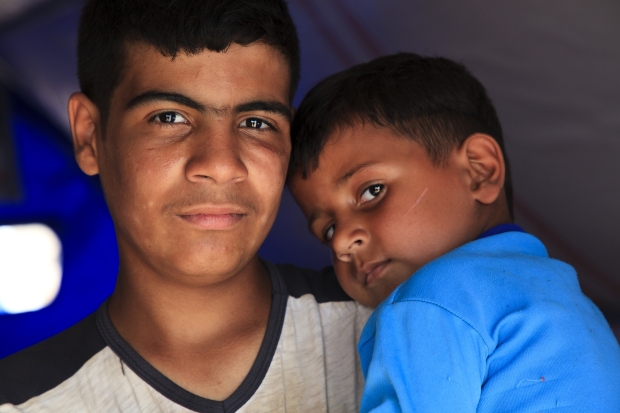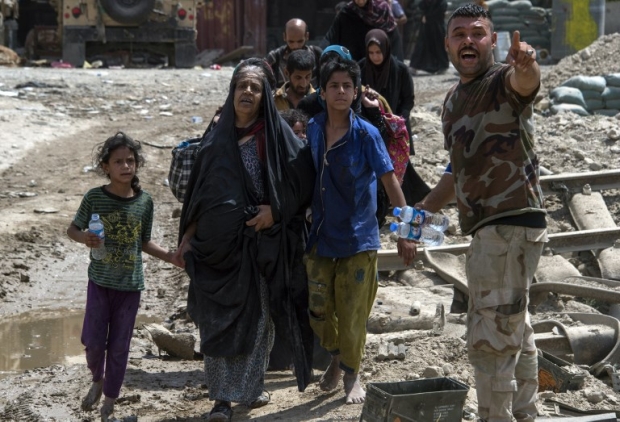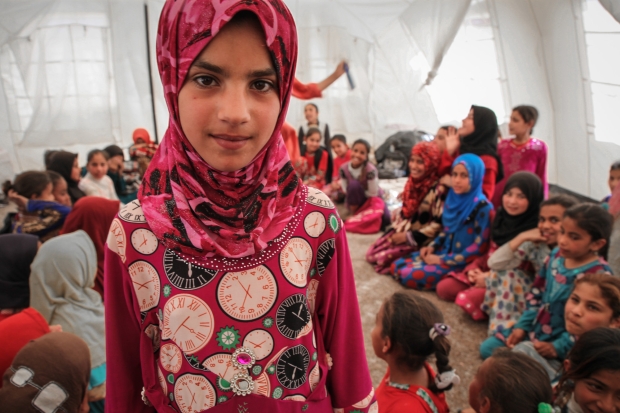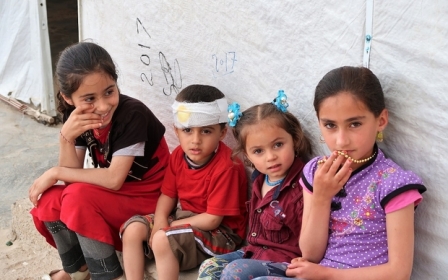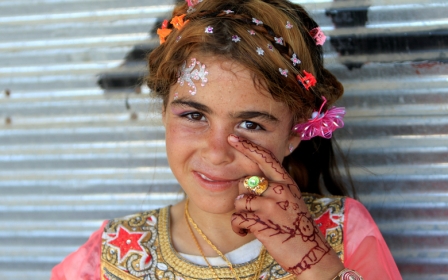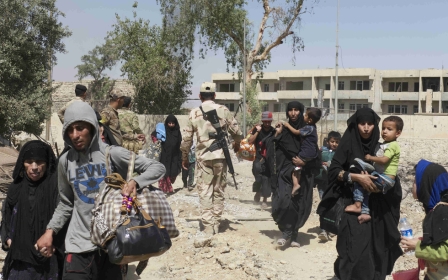'An infinite darkness': Children face lingering trauma from life under IS
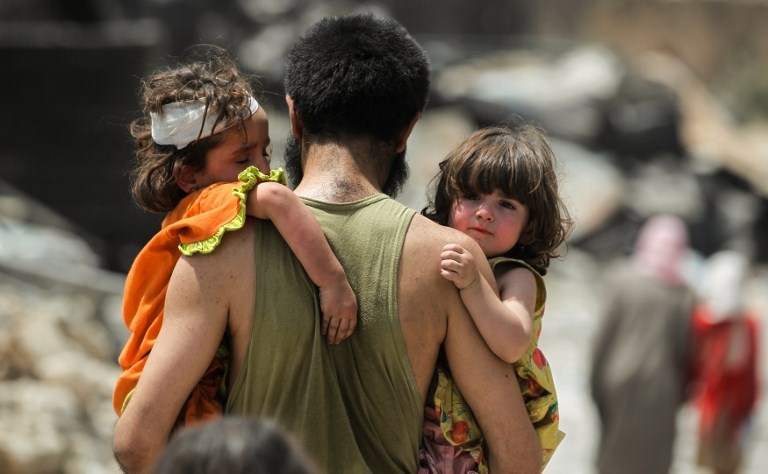
MOSUL, Iraq - At only 15, Anjia's dark eyes seem to reveal a knowing look far beyond her years. After three years of living under Islamic State, this may not come as a surprise.
Her father, Ibrahim, had been working as a local magistrate in Mosul, until IS militants swept into the city in the summer of 2014, choosing it as their Iraqi base.
IS forced Anjia's father out of her job, and replaced his court with an Islamic one. A foreign fighter from Nigeria was soon given his position as magistrate.
For two and a half years, Ibrahim kept telling Anjia and her sister never to stop smiling. The habit, he said, should be drilled into them – for one day the injustices would finally be over, and their lives would return to normal.
His father, an educated and well-read lawyer, had to take up carpentry, in order to make ends meet.
"Every day we read for about half an hour, my dad hid the books in a hole on the floor, along with his mobile phone," says Anjia today, while walking around the cramped streets of Al-Jazair, the east Mosul district where the family have returned to live after the liberation - they were finally able to flee in January 2017.
"He pulled out those books as if they were an amulet, the secret to not being corrupted by IS's teachings and beliefs," she says.
Forgiving, for the future of Iraq
"He said that the children are the future of Iraq and that we should forgive, move on and rebuild the country."
After IS leader Abu Bakr al-Baghdadi and his followers settled in Mosul, Anjia stopped going to school.
The only lessons she has received over the last few years have been the stories told her by her parents, and the secret writing exercises she did with them each day.
"One evening, around 7pm, my sister and I walked together to a shop in the neighbourhood, to buy some flour.
"Just after we arrived home again, four women from Khansa, the female IS police force, knocked on our door, screaming that we were sinners, as we had gone out on our own – without a male guardian. They said my sister's dress was haram."
Anjia's little sister, 12 at the time, had offended the police as her hands were not gloved.
"My sister started crying as they shouted at my father that we were sinners, and that he should have whipped my sister."
The next day, Anjia recalls, two of the female police returned to the house, dragging her sister out into the street.
They called on all the neighbours to come out of their homes, demanding that they witness the child's punishment.
We were surrounded by darkness, nothing in front of us had the semblance of light
- Anjia, 15
They forced her to lie down the ground, Anjia says, and whipped her 30 times in front of her family and the neighbourhood.
"When she finally got up from the floor they said that the next time they would kill her," Anjia adds, defiantly, clearly proud that, in the end, they were able to survive such brutality.
"We were surrounded by darkness, nothing in front of us had the semblance of light. We could not walk alone, we could not wear any colours," Anjia says.
"An infinite darkness, inside and outside."
IS is expected to face a complete defeat in Mosul within days, and only several hundred militants are thought to remain in the last pocket of the city.
Nearly 900,000 citizens remain displaced from the city, according to the latest data released by the Iraqi government, most of them have lost loved ones, or are themselves victims of terror, threats and violence.
Those that remain have largely been used by IS as human shields to avoid the coalition's air strikes.
According to the UN's children's agency, UNICEF, more than 1,000 children have been killed by IS in Iraq since 2014, and in the last six months alone, 152 children have been killed and 255 injured.
Children recruited to fight
And while Anjia feels she lost part of her childhood to IS, she also lost a friend – a classmate who was recruited to the group.
"He was a child like me, his name was Adnan and I had known him since we were eight," she says, a knowing maturity in her voice.
A few months after the arrival of IS, Adnan came home from school in shock, the new curriculum terrifying him.
"His mother was crying in my mother's arms, telling her how he had come home asking if it was true that in order to make the prophet happy he would have to kill the infidels with his own hands," Anjia recalls.
He stopped attending class, but one morning the militants came to take him to the Al-Nuri Mosque – from where Baghdadi famously declared his caliphate, and which the group themselves recently destroyed, in defeat – and forced him to pledge allegiance to the group, and to change his name.
They did not hear anything of Adnan again until six months later, when a militant came to his mother's door, telling her that Adnan was a martyr, and than he had died in the name of Allah.
As she discusses Adnan today, Anjia's eyes are full of tears, and she sounds like a child herself again. As if trying to make sense of the reality of the situation, Anjia keeps repeating that "he was just a child".
And while the complete liberation of Mosul seems imminent, depriving IS of its Iraqi capital, this will not erase the deeply entrenched factors behind its rise in the first place – the poverty, sectarian disputes and internal Iraqi rivalries, observers warn.
Those NGOs working with children in Iraq and the refugee camps in Iraqi Kurdistan thus stress the need for a solid deradicalisation process for hundreds of thousands of children potentially indoctrinated by IS.
Toxic levels of stress
Save the Children on Wednesday released a report documenting the extent of psychological trauma on those young people who have lived under IS rule.
Such exposure to extreme levels of violence and deprivation has caused all of those children interviewed to display clear signs of a condition known as "toxic stress," the report – entitled "Mosul's children mentally scarred by brutal conflict" – says.
But psychological support for children and their parents is chronically underfunded, the charity says, with needs for 2017 so far just 2 percent funded. And the total UN Humanitarian Response Plan for this year has less than half the funding it needs.
These children are not going to heal in weeks, or even months. They'll need support for years to come
- Marcia Brophy, Save the Children
Marcia Brophy, Save the Children's senior mental health adviser for the Middle East, says the children they spoke to rarely even smiled.
"It was as though they had lost the ability to be children.
"What was striking was how introverted and withdrawn children have become," she says.
"When we asked them what they liked about themselves, children often said things like ‘I'm quiet', ‘I stay in a safe place' or ‘I obey orders'.
"Their time under ISIS, and making a life-or-death escape, has taken a truly terrible toll.
"These children are not going to heal in weeks, or even months. They'll need support for years to come."
Learning to count with bullets
Mustafa is 10, and has never left his district of Wadi Ajar, in west Mosul; he didn't even leave his house during the heaviest days of fighting in the city.
"My dad says that it's better to starve in our house than to beg for food in a refugee camp," he tells MEE.
Mustafa walks through the rubble of his area, looking around fearfully, as if IS might not have fully departed yet.
"They forced us to attend Islamic schools, destroyed our books, and replaced them with their programmes. They taught maths by summing up bullets, a bullet plus a bullet.
"When some of us showed resistance, they sent their children to convince us. They were already adults, they were armed, violent, and threatening," Mustafa says.
"One day in the classroom, an IS teacher told me I was ready to be transferred to the training camp," Mustafa recalls.
Sometimes I wake up at night thinking of this scene, I do not think I'll ever forget it. I'll never forget his face
- Mustafa, 10
"I said I did not want to go, and he laughed loudly and replied: 'Do you not want to learn to shoot like my son? He is 11 and already uses the Kalashnikov.' I said no."
"From the day after my father kept me in the house and he never sent me to school again."
Mustafa recounts that IS militants and their children gathered the boys in the streets, promising them money, cars and whatever they wanted, giving toys and food to the youngest ones and money to the others to persuade them to join IS and later training camps.
"Then the executions started. They assembled people around the university area and hung people, dragged us all out of the house, forcing us to attend because each of those hanged people could be us if we were not faithful to the precepts of the Caliph.
"Even our neighbour was killed, he was just 30 years old. They took him out of the house screaming that he was a spy of the Iraqi army and hanged him.
"Sometimes I wake up at night thinking of this scene, I do not think I'll ever forget it. I'll never forget his face."
Even Fatma, 14, had to witness unprecedented violence.
When the offensive began, Fatma and her family were trapped in their home in New Mosul, in the west of the city.
IS forced Fatma's family, along with a dozen others, to remain in the building for 10 days – using it as a hiding place, and using the civilians as human shields.
"The older women were shouting, children did not know what to do, they asked for food, and there was none. The children cried more, the mothers cried more.
"And nobody dared to ask the militia for anything. They kept what little food remained for themselves."
IS has not only destroyed my life, but it has destroyed the future of a whole generation
- Fatma, 14
Fatma recalls the constant noise of the sniper shootings that accompanied the days of the battle, remembers the corner of the room where she spent whole days without being able to move, fearful of being hit by mortar fire.
"The day we fled was the day of my freedom and my greatest pain. We knew the army was coming in," she says.
"IS militants had forced the men to make holes in the walls so they could escape without being seen.
"Suddenly there was the sound of a shot – I only realised afterwards that it was a mortar. We tried to run away but my dad was hit by shrapnel. It killed him."
"When I think to that day I think how IS has not only destroyed my life, but it has destroyed the future of a whole generation."
New MEE newsletter: Jerusalem Dispatch
Sign up to get the latest insights and analysis on Israel-Palestine, alongside Turkey Unpacked and other MEE newsletters
Middle East Eye delivers independent and unrivalled coverage and analysis of the Middle East, North Africa and beyond. To learn more about republishing this content and the associated fees, please fill out this form. More about MEE can be found here.


